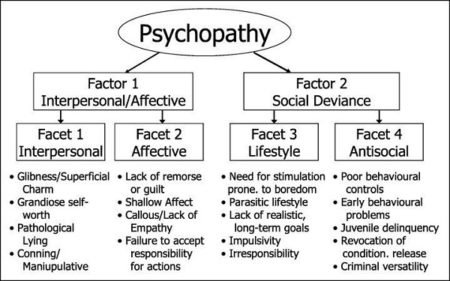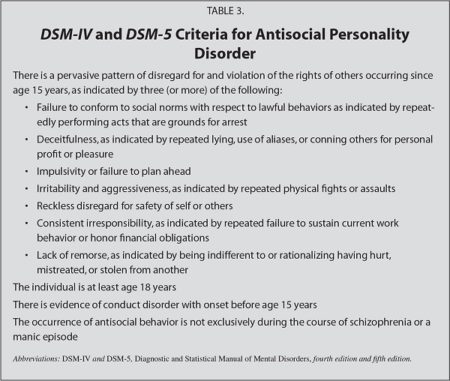Psychopaths rarely feel guilty about their behaviour, no matter how much they harm others. Psychologist Perpetua Neo told INSIDER that trying to get people with antisocial personality disorder to change or apologize for their treatment will only keep you and them in a toxic and abusive cycle. If you think you are being targeted, be careful to respect your boundaries and not try to hold them accountable for their actions. [Sources: 11, 14]
Psychopaths are often seen by others as charming, trustworthy and in steady, normal jobs. In fact, psychiatrists do not differentiate between sociopaths and psychopaths solely on the basis of their behavior; they refer to a person diagnosed with an antisocial personality disorder (ASPD) to treat or alleviate the sociopath diagnosed even if their mental state is the result of social conditions or childhood abuse and a psychopath if the disorder is congenital. Researchers tend to believe that sociopathy is due to environmental factors such as the raising of a child or teenager in a negative household as a result of physical abuse, emotional abuse or childhood trauma. [Sources: 7, 14]
 Neglect and childhood abuse are important predictors of severe antisocial behaviour such as sociopathy in later life. In some cases, symptoms begin to take hold before the age of fifteen and occur. Mental trauma as a child is thought to impair proper brain development, which may explain the link, Johnson says. [Sources: 7, 16]
Neglect and childhood abuse are important predictors of severe antisocial behaviour such as sociopathy in later life. In some cases, symptoms begin to take hold before the age of fifteen and occur. Mental trauma as a child is thought to impair proper brain development, which may explain the link, Johnson says. [Sources: 7, 16]
Although sociopathy and psychopathy have many common behavioral characteristics, this can lead to confusion. The differences between psychopaths and sociopaths are unclear, and both are a pop-cultural term for an antisocial personality disorder (ASPD) rather than an actual clinical term. Some psychiatrists treat sociopaths and psychopaths equally, while criminologists treat them differently because of different external behaviors. [Sources: 2, 7, 12]
In general, psychopathic behavior seems to be typical of a person who uses charm and charisma to manipulate others. On the other hand, a person with sociopathic behavior is more unpredictable, more likely to be angry, and can self-harm in their daily lives. When people say this stereotype, they assume a short-lived lack of empathy, free from guilt or shame, ambivalent about the consequences of manipulation. However, a psychopath is cold-blooded, violent and devoid of morality, incapable of love and calculation, so it can be difficult to distinguish the difference between sociopathic behavior and psychopathic behavior. [Sources: 2]
 Many psychiatrists, forensic psychologists, criminologists and police officers use the term psychopath. Psychopaths and sociopaths are generally used to describe a person who is prone to criminal and violent behavior and does not account for the feelings and interests of others and feelings of regret or guilt for his or her crimes. Although the terms “psychopath” and “sociopath” are commonly used in the scientific literature, including the Diagnostic and Statistical Manual of Mental Disorders (DSM) they are not clearly defined by mental health professionals who prefer to understand them as types of antisocial personality disorders (APDs), states that differ in some characteristic traits, although they share many traits. [Sources: 5, 12]
Many psychiatrists, forensic psychologists, criminologists and police officers use the term psychopath. Psychopaths and sociopaths are generally used to describe a person who is prone to criminal and violent behavior and does not account for the feelings and interests of others and feelings of regret or guilt for his or her crimes. Although the terms “psychopath” and “sociopath” are commonly used in the scientific literature, including the Diagnostic and Statistical Manual of Mental Disorders (DSM) they are not clearly defined by mental health professionals who prefer to understand them as types of antisocial personality disorders (APDs), states that differ in some characteristic traits, although they share many traits. [Sources: 5, 12]
Both sociopaths and psychopaths are classified as antisocial personality disorder (ASPD), a class of personality disorder that includes persistent negative behavior. The terms psychopath and sociopath are often interchangeably used to refer to people who tend to hurt others, engage in violence or criminal behavior, and disregard the feelings or interests of others. Leading experts disagree on whether there is a significant difference between the terms psychopath and sociopath, but agree on the difference and disagree on what it is. [Sources: 9, 12]
Psychopathy and sociopathy are types of antisocial personality disorders that are characterized by certain behaviors and attitudes such as manipulation, deception, lack of empathy and aggression. Of course, the most interesting link between serial killers and psychopaths and sociopaths is that not all psychopaths or sociopaths become serial killers. As the US Federal Bureau of Investigation (FBI) notes, some of the best-known serial killers with antisocial personality disorders share certain characteristics. [Sources: 1, 13]
Certain characteristics common to known serial killers and these anti-social personality disorders include predatory behavior (such as Ivan Milat Hunt who murdered his seven victims), sensationalism (think hedonistic killers who kill out of excitement and excitement, such as 21-year-old Thomas Hemming who murdered two people in 2014), knowledge of what it feels like to kill, lack of remorse, impulsiveness, need for control and power over others (such as Dennis Rader, an American serial killer who killed ten These two types of personalities have a pervasive pattern of disregard for the safety and rights of others. Social definitions revolve around dealing with violence, anger, hatred and emotionlessness. [Sources: 1, 8, 14]
 When most of us think of psychopaths and sociopaths, we first think not of high-ranking executives or brilliant doctors, but of the world’s serial killers. The crucial difference between a psychopath and a sociopath is that a psychopath has a conscience, a small voice that lets us know when something wrong is being done, says L. Michael Tompkins, Ed.D. A lack of conscience in psychopaths means that they feel no guilt, while sociopaths feel guilt. [Sources: 8, 15]
When most of us think of psychopaths and sociopaths, we first think not of high-ranking executives or brilliant doctors, but of the world’s serial killers. The crucial difference between a psychopath and a sociopath is that a psychopath has a conscience, a small voice that lets us know when something wrong is being done, says L. Michael Tompkins, Ed.D. A lack of conscience in psychopaths means that they feel no guilt, while sociopaths feel guilt. [Sources: 8, 15]
This appears as a diagnosis in the DSM-V Diagnostic and Statistical Manual of Mental Disorders (DSM-V). The new issue of DSM-5 states that ASPD shows a lack of respect for the feelings of others and a violation of human rights. The ability to stand in someone’s shoes and understand what they are feeling. [Sources: 6, 8, 15]
There are traditional personality tests that include subscales related to psychopathy, and they assess non-specific tendencies toward antisocial or criminal behavior. These include the Minnesota Multiphasic Personality Inventory, the Psychopathic Deviate Scale, the California Psychological Inventory of Socialization, the Millons Clinical Multiaxial Inventory and the Antisocial Personality Disorder Scale. The Levenson Self-Report Psychopathy Scale (LSRP) and Hare Self-Report Psychopathy Scale (HSRP), a term for a self-report test from the Minnesota Multipsychological Inventory, are widely used in modern psychopathic research in adults. [Sources: 4]
The DSM-5 manual is used by physicians and psychiatrists to assess and diagnose mental illness. Sociopaths tend to be erratic and impulsive, while psychopaths are able to maintain the semblance of a stable, normal life. Dr. Coulter recommends a professional mental health assessment if you are concerned about a long-standing pattern of behaviour that is problematic, especially if the behavior causing problems in your private life or workplace. [Sources: 3, 10]
 Sources #####
Sources #####

